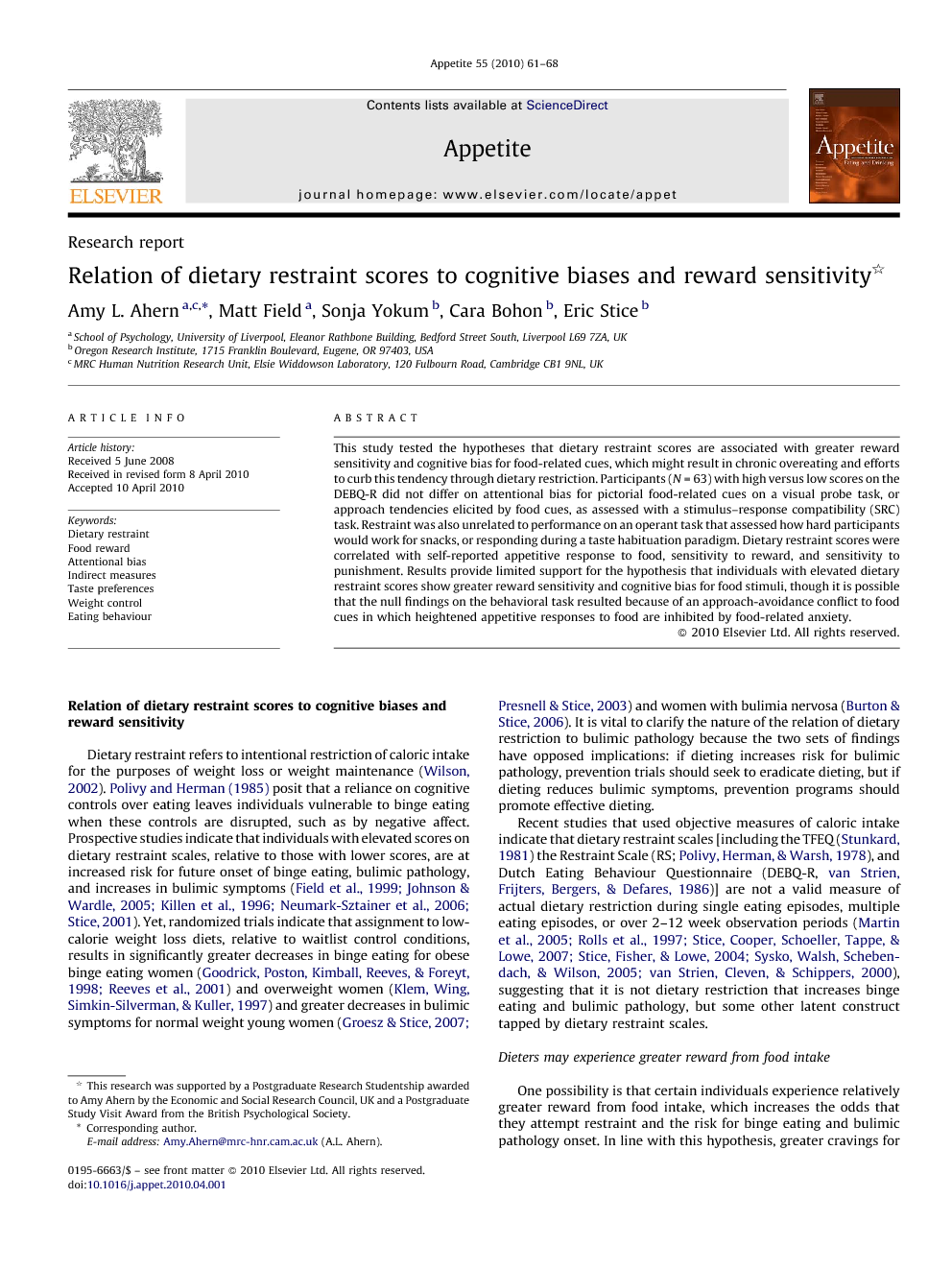This study tested the hypotheses that dietary restraint scores are associated with greater reward sensitivity and cognitive bias for food-related cues, which might result in chronic overeating and efforts to curb this tendency through dietary restriction. Participants (N = 63) with high versus low scores on the DEBQ-R did not differ on attentional bias for pictorial food-related cues on a visual probe task, or approach tendencies elicited by food cues, as assessed with a stimulus–response compatibility (SRC) task. Restraint was also unrelated to performance on an operant task that assessed how hard participants would work for snacks, or responding during a taste habituation paradigm. Dietary restraint scores were correlated with self-reported appetitive response to food, sensitivity to reward, and sensitivity to punishment. Results provide limited support for the hypothesis that individuals with elevated dietary restraint scores show greater reward sensitivity and cognitive bias for food stimuli, though it is possible that the null findings on the behavioral task resulted because of an approach-avoidance conflict to food cues in which heightened appetitive responses to food are inhibited by food-related anxiety.
Dietary restraint refers to intentional restriction of caloric intake for the purposes of weight loss or weight maintenance (Wilson, 2002). Polivy and Herman (1985) posit that a reliance on cognitive controls over eating leaves individuals vulnerable to binge eating when these controls are disrupted, such as by negative affect. Prospective studies indicate that individuals with elevated scores on dietary restraint scales, relative to those with lower scores, are at increased risk for future onset of binge eating, bulimic pathology, and increases in bulimic symptoms (Field et al., 1999, Johnson and Wardle, 2005, Killen et al., 1996, Neumark-Sztainer et al., 2006 and Stice, 2001). Yet, randomized trials indicate that assignment to low-calorie weight loss diets, relative to waitlist control conditions, results in significantly greater decreases in binge eating for obese binge eating women (Goodrick et al., 1998 and Reeves et al., 2001) and overweight women (Klem, Wing, Simkin-Silverman, & Kuller, 1997) and greater decreases in bulimic symptoms for normal weight young women (Groesz and Stice, 2007 and Presnell and Stice, 2003) and women with bulimia nervosa (Burton & Stice, 2006). It is vital to clarify the nature of the relation of dietary restriction to bulimic pathology because the two sets of findings have opposed implications: if dieting increases risk for bulimic pathology, prevention trials should seek to eradicate dieting, but if dieting reduces bulimic symptoms, prevention programs should promote effective dieting.
Recent studies that used objective measures of caloric intake indicate that dietary restraint scales [including the TFEQ (Stunkard, 1981) the Restraint Scale (RS; Polivy, Herman, & Warsh, 1978), and Dutch Eating Behaviour Questionnaire (DEBQ-R, van Strien, Frijters, Bergers, & Defares, 1986)] are not a valid measure of actual dietary restriction during single eating episodes, multiple eating episodes, or over 2–12 week observation periods (Martin et al., 2005, Rolls et al., 1997, Stice et al., 2007a, Stice et al., 2004, Sysko et al., 2005 and van Strien et al., 2000), suggesting that it is not dietary restriction that increases binge eating and bulimic pathology, but some other latent construct tapped by dietary restraint scales.


